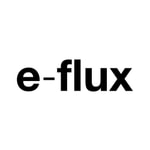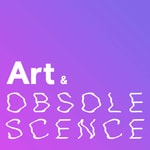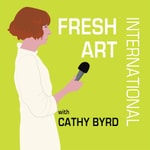e-flux podcast – Détails, épisodes et analyse
Détails du podcast
Informations techniques et générales issues du flux RSS du podcast.

e-flux podcast
e-flux
Fréquence : 1 épisode/29j. Total Éps: 92

Classements récents
Dernières positions dans les classements Apple Podcasts et Spotify.
Apple Podcasts
🇺🇸 États-Unis - visualArts
28/07/2025#80🇩🇪 Allemagne - visualArts
27/07/2025#94🇺🇸 États-Unis - visualArts
27/07/2025#59🇩🇪 Allemagne - visualArts
26/07/2025#87🇩🇪 Allemagne - visualArts
25/07/2025#77🇩🇪 Allemagne - visualArts
24/07/2025#53🇩🇪 Allemagne - visualArts
23/07/2025#32🇬🇧 Grande Bretagne - visualArts
19/07/2025#92🇩🇪 Allemagne - visualArts
19/07/2025#88🇬🇧 Grande Bretagne - visualArts
18/07/2025#31
Spotify
Aucun classement récent disponible
Liens partagés entre épisodes et podcasts
Liens présents dans les descriptions d'épisodes et autres podcasts les utilisant également.
See allQualité et score du flux RSS
Évaluation technique de la qualité et de la structure du flux RSS.
See allScore global : 48%
Historique des publications
Répartition mensuelle des publications d'épisodes au fil des années.
African Film Institute: Ahmed El Maanouni, Omar Berrada
mardi 30 juillet 2024 • Durée 40:08
This conversation was recorded at e-flux before a screening of Ahmed El Maanouni’s Al Hal [Trances], curated by Omar Berrada. The evening was co-presented with ArteEast.
Al Hal [Trances] (1981, 88 minutes) is a classic of Moroccan cinema and a compelling introduction to it. While presenting itself as a music documentary on the iconic band Nass El Ghiwane, it is also a film about friendship and collaboration, archival memory, the anti-colonial imagination, and working-class life in Casablanca.
Ahmed El Maanouni is a writer, director, cinematographer, and producer born in Casablanca in 1944. Among his essential works are Alyam Alyam (1978), the first Moroccan film to be selected at the Cannes Film Festival and winner of the 7e Art prize at FESPACO in Ouagadougou; and Al Hal [Trances] (1981), which was the first movie to be restored by the World Cinema Project in 2007. Among his other works are the feature films Burned Hearts (2007) and Fadma (2017), as well as The Paths of Freedom (2015–16), a documentary trilogy that tells the story of the Moroccan struggle for independence through the experience of families.
Omar Berrada is a writer and curator whose work focuses on the politics of translation and intergenerational transmission. He is the author of the poetry collection Clonal Hum (2020), and the editor or co-editor of several books, including La Septième Porte, a posthumously published history of Moroccan cinema by Ahmed Bouanani (2020), and Another Room to Live In: 15 Contemporary Arab Poets (2024). He is currently studying racial dynamics in North Africa while living in New York.
The African Film Institute aims to create a home and a place of intimacy with African cinema in New York, through developing gradually and organically a viewing program animated by fellowships; a growing library; an active writers’ room; and an expanding catalog of recorded dialogs. The African Film Institute draws from the visual cultures that view cinema as an evening school: a popular information system in the service of education, aesthetic experience, and public dissemination—employing a methodology concerning the use of cinema’s collective production, and investing in viewing methods informed by different uses of time, visual and textual histories, and social struggles and hopes in mutuality between their own locality and the world at large. The African Film Institute is convened by Christian Nyampeta and hosted by e-flux Screening Room.
African Film Institute: Sosena Solomon, Mpho Matsipa, Natacha Nsabimana
lundi 17 juin 2024 • Durée 30:55
A conversation between filmmaker Sosena Solomon, designer and urban scholar/theorist Mpho Matsipa, and anthropologist Natacha Nsabimana.
This episode was recorded at e-flux Screening Room before a screening of Merkato, curated by Natacha Nsabimana. Sosena Solomon’s Merkato is a documentary tracing the lives of four people as they navigate the demands of life and work in one of the biggest markets in Africa in Addis Ababa, Ethiopia. Filmed on location in Merkato, before a radical architectural transformation, Solomon’s documentary invites us to ask expansive questions about space, architecture, transition, and preservation.
Sosena Solomon is an Ethiopian-American social documentary film and multimedia visual artist whose work explores cross-sections of various subcultures and communities in flux, carefully teasing out cultural nuances and capturing personal narratives through arresting visual storytelling. Solomon has worked for many years in the commercial and nonprofit sectors as a director and cinematographer on many short film projects, including Dreaming of Jerusalem, a Discovery-plus original documentary about the Ethiopian-Jewish community in Gondar, and Merkato. She has exhibited work at the Sundance Film Festival, Cinema Africa, Tribeca, and DOC NYC. She earned her BA in Television Production from Temple University and her MFA in Social Documentary film from the School of Visual Arts. Solomon is currently lecturing in the Fine Arts Department at the University of Pennsylvania’s Stuart Weitzman School of Design, and working with the Metropolitan Museum of Art to create new digital and in-gallery content that will reframe the Museum’s African art galleries.
Mpho Matsipa is an educator, researcher, and independent curator. Matsipa holds a PhD in Architecture from the University of California, Berkeley, pursued as a Fulbright Scholar. She has curated several exhibitions, discursive platforms, and experimental architectural research including the Venice International Architecture Biennale (2008; 2021); African Mobilities at the Architecture Museum, Pinakothek der Moderne in Munich (2018); and Studio-X Johannesburg, in South Africa (2014–16). Her curatorial and research interests are at the intersection of urban studies, experimental architecture, and visual art. Mpho is an associate curator for the Lubumbashi Biennale, in the Democratic Republic of Congo (2024) and she teaches History and Theory at SCI-Arc.
Natacha Nsabimana teaches in the anthropology department at the university of Chicago. Her research and teaching interests include postcolonial critique, musical movements, and the cultural and political worlds of African peoples on the continent and in the diaspora.
The African Film Institute aims to create a home and a place of intimacy with African cinema in New York, through developing gradually and organically a viewing program animated by fellowships; a growing library; an active writers’ room; and an expanding catalog of recorded dialogs. The African Film Institute draws from the visual cultures that view cinema as an evening school: a popular information system in the service of education, aesthetic experience, and public dissemination—employing a methodology concerning the use of cinema’s collective production, and investing in viewing methods informed by different uses of time, visual and textual histories, and social struggles and hopes in mutuality between their own locality and the world at large. The African Film Institute is convened by Christian Nyampeta and hosted by e-flux Screening Room.
Laure Prouvost in conversation with Kathy Noble
vendredi 13 octobre 2023 • Durée 53:21
Recorded live at e-flux Screening Room on Tuesday, September 5, 2023 during a retrospective screening of selected works by Laure Prouvost. The pre-screening introduction by Amal Issa and Laure Prouvost is followed by a conversation between the artist and writer-curator Kathy Noble.
The screening portion of the program featured a selection of works spanning the last decade: OWT (2007, 3 minutes), Finger Point Green (2010, 3 minutes), They Parlaient Idéale (29 minutes, 2019), Every Sunday, Grandma (2022, 7 minutes), OMA JE (You, My, Omma, Mama, Shadow Does, and A Walking Story) (2023, 22 minutes).
Language—in its broadest sense—permeates the video, sound, installation, and performance work of Laure Prouvost. Known for her immersive and mixed-media installations that weave in film in humorous and idiosyncratic ways, Prouvost’s work addresses miscommunication and ideas becoming lost in translation. Playing with language as a tool for the imagination, Prouvost is interested in confounding linear narratives and expected associations among words, images, and meaning. She combines existing and imagined personal memories with artistic and literary references to create complex works that muddy the distinction between fiction and reality. At once seductive and jarring, her approach to filmmaking employs layered storytelling, quick edits, montage, and wordplay, and is composed of a rich, tactile assortment of images, sounds, and spoken and written phrases.
Laure Prouvost (b. 1867, Lieumeconu, France) lives and works. Here a long list of museums and institutions. A line, interesting things, a coma, a line, a list of residencies and prizes. A selection of solo projects including: an Oma-je in Vienna, a flying Grandma in Oslo, Esmé Blue in Busan, Helsinki, and Madrid, an elastic arm hold in tight in Copenhagen, a Swallowing and Breathing in Eindhoven, a Smoking Mother in Copenhagen, a Melting Into Another in Lisbon and Sonsbeek, an Occupied Paradise in Aalst, Deep See Blue Surrounding You in Venice, Toulouse, and Lille, a Waiting Room with objects in Minneapolis, a New Museum for Granddad in Milano, a tearoom for Grandma in Derry, a karaoke room in Brussels, a new octopus ink vodka bar for Gregor in Rotterdam, A travel agency for an Uncle in Frankfurt, a lobby for love among the artists in the Hague and Luzern… tea bags, and wet floors and tentacules.
Kathy Noble is a curator and writer based in New York, currently working as Senior Curator at Performa. There she previously served as Senior Curator and Head of Curatorial Affairs to oversee the program and curated numerous commissions. As Curator, Interdisciplinary, at Tate Modern she co-curated Tate Modern Live, The Long Weekend Festival, and Art in Action, the first program in The Tanks spaces. In 2016 she launched the inaugural Art Night festival with the Institute of Contemporary Arts, London, presenting ten site-specific projects at venues across Westminster. She has published numerous essays in books and magazines such as Artforum, frieze, and Mousse Magazine.
Esteban Jefferson: MAY 25th, 2020
mardi 25 juillet 2023 • Durée 40:51
Recorded in February 2023, Keli Maksud talks to Esteban Jefferson about his exhibition, MAY 25th, 2020, at 303 Gallery. A second iteration of the show will open at Goldsmiths CCA in October 2023.
Esteban Jefferson's practice centers around issues of race, identity and the legacies of colonialism. Using photography, drawing, painting, and sound installation as forms of documentation, Jefferson paints the focal points of his compositions in great detail, creating a stark contrast between the subject or object in focus and the surrounding environment. The paintings are left intentionally unfinished, creating a raw style emblematic of his investigative process. Well known for his series, “Petit Palais”, first featured at White Columns, New York, in 2019, Jefferson’s latest works consider the related symbolism of flags and toppling of equestrian monuments in New York, through the lens of racial and colonial legacies.
Esteban Jefferson was born in New York City in 1989, and attended Columbia University. Recent group exhibitions include Art on the Grid, Public Art Fund, New York (2020); ESTAMOS BIEN: La Trienal, El Museo del Barrio, New York (2021) and Open Call, The Shed, New York (2021). Jefferson lives and works in New York City.
Raven Chacon: Solos
mardi 20 juin 2023 • Durée 32:06
An excerpt from Raven Chacon’s performance Solos, followed by a conversation with Xenia Benivolski, recorded live at e-flux on April 27. Solos, is a series of short, improvised works performed in quick succession. Using a variety of acoustic and electronic instruments, Chacon’s experimental compositions range from sparse, minimalistic soundscapes to complex, multi-layered works that incorporate voices, noises, and found sounds.
Raven Chacon is a Pulitzer Prize–winning composer, performer, and installation artist from Fort Defiance, Navajo Nation. Since 2004, he has mentored more than three hundred Native high school composers in writing new string quartets for the Native American Composer Apprentice Project (NACAP). As a solo artist, collaborator, and a member of Postcommodity from 2009 to 2018, Chacon has exhibited, performed, or had works performed at the Los Angeles County Museum of Ar, The Renaissance Society, San Francisco Electronic Music Festival, REDCAT, Vancouver Art Gallery, Haus der Kulturen der Welt, SITE Santa Fe, Ende Tymes Festival, New York, the Whitney Biennial, documenta 14, Carnegie International, and Carnegie Museum of Art. Chacon is the recipient of a United States Artists Fellowship, a Creative Capital Award, Native Arts and Cultures Foundation Artist Fellowship, the American Academy’s Berlin Prize, the Bemis Center’s Ree Kaneko Award, and the Pew Center for Arts & Heritage’s Fellowship-in-Residence.
Xenia Benivolski writes and lectures about visual art, sound, and music. She is the curator of the project You Can’t Trust Music which is an online e-flux exhibition.
Jacopo Galimberti: Images of Class
vendredi 19 mai 2023 • Durée 41:52
Andreas Petrossiants talks to author Jacopo Galimberti about his book, Images of Class: Operaismo, Autonomia and the Visual Arts (1962–1988), published in 2022.
Jacopo Galimberti is an art historian and Assistant Professor at IUAV (Venice). He is the author of Individuals Against Individualism: Art Collectives in Western Europe (1956-1969) (Liverpool) and Images of Class: Operaismo, Autonomia and the Visual Arts (1962-1988) (Verso), which historicizes those political currents and movements alongside visual and literary culture that was either in dialogue or in debate with the figures he centers—as well as the revolutionary aesthetic/cultural theory that they produced through workers’ inquiries and research on forms of postwar labor, and later participation in extraparliamentary militant social and urban movements. In addition to providing an art and architecture historical perspective on these movements, the book acts as a very helpful entry-point to operaist theory, which Classe Operaia called an “anti-dialectical Marxism,” including the work of Mario Tronti, Rita di Leo, Mandredo Tarfuri, Silvia Federici, and the various groups and grassroots movements that would constitute autonomia.
Referenced in this episode: Rossella Biscotti, The Trial at e-flux (2012)
Shubigi Rao on Pulp and curating the Kochi-Muziris Biennale
mercredi 26 avril 2023 • Durée 51:28
Ben Eastham talks to Shubigi Rao about her long term project Pulp, and curating the Kochi-Muziris Biennale.
Artist and writer Shubigi Rao makes layered installations of books, etchings, drawings, pseudo-scientific machines, metaphysical puzzles, video, ideological board games, garbage and archives, and has been exhibited and collected in Singapore and internationally. Her interests include archaeology, neuroscience, libraries, archival systems, histories and lies, literature and violence, ecologies and natural history.
Since 2014 she has been visiting public and private collections, libraries and archives globally for Pulp, a decade-long film, book and visual art project about the history of book destruction. See here for more info.
Rao curated the Kochi-Muziris Biennale 2022–23. The biennale was originally planned for 2020–21, but was delayed due to COVID-19.
Dorit Chrysler on Calder Plays Theremin
lundi 3 avril 2023 • Durée 42:27
Recorded at e-flux before the launch of Dorit Chrysler’s album, Calder Plays Theremin, on February 23, 2023. The conversation with Sanna Almajedi is followed by an excerpt from Dorit’s live performance.
The album Calder Plays Theremin is a co-release by the NY Theremin Society and Fridman Gallery, and can be ordered on Bandcamp. The album is based on a sound piece commissioned by The Museum of Modern Art in conjunction with the exhibition Alexander Calder: Modern from the Start. For the piece, Chrysler identified two of Alexander Calder’s sculptures, Snow Flurry, I (1948) and Man-Eater with Pennants (1945), to interact and “play” multiple theremins on site.
Dorit Chrysler is a Berlin-based composer and sound artist, and co-founder of the NY Theremin Society. Her work explores new applications of the theremin in various forms. Chrysler was awarded the Austrian State Stipend in Composition 2023 and earned her Master's Degree of Musicology in Vienna. She has performed worldwide, and written for film and the theater. Chrysler’s compositions have been collected by the Guggenheim and Moderna Museet, and presented at MoMA, the Venice Biennale, and Klang Fest. Chrysler has collaborated with the San Francisco Symphony, CERN, Laurie Spiegel, Herb Deutsch, Elliot Sharp, Trentemøller, Alva Noto, and Gaite Lyrique. She produced a ten-piece orchestra performance for the LA Disney Hall, and is the founder of Dame Electric, a festival featuring female pioneers of electronic music. Her recordings appear on over twenty releases by labels such as InMyRoomRecords (DE), The Prurience Factory (US), Monika Enterprise (DE), PlagDichNicht (AU), PlasticTray Records (US), and Mute.
In Union: Hock E Aye VI Edgar Heap of Birds, and Keith Christensen
jeudi 2 mars 2023 • Durée 26:07
A conversation with artists Hock E Aye VI Edgar Heap of Birds, and Keith Christensen on the occasion of their exhibition and book project, In Union, on view at Open Source Gallery in New York. In Union highlights the native role in a union strike, union families, and environmental protests. The conversation is hosted by Matt Peterson. Read more about the project here.
Hock E Aye Vi Edgar Heap of Birds has worked as an artist, activist, and teacher. Heap of Birds's artwork confronts unacknowledged histories of state and settler violence against Native communities in the United States. His piece “Our Red Nations Were Always Green” was published by e-flux Architecture in May 2021.
Keith Christensen is an artist and designer. His work includes a focus on social justice issues. He created Game Turn, Learning from the Minneapolis Truckers’ Strike of 1934, a book and board game installation. He recently authored the book See & Say Time on his paintings.
Matt Peterson is an organizer at Woodbine, an experimental space in New York City. He co-directed the film Spaces of Exception (2018), and co edited the book The Mohawk Warrior Society (2022).
Maria Chávez on Topography of Sound (2007–now)
mardi 7 février 2023 • Durée 58:18
Sanna Almajedi speaks to Maria Chávez on the occasion of Topography of Sound (2007–now) at e-flux. The conversation is followed by an excerpt from the performance, Maria’s first public live show since a medically induced sabbatical.
Maria Chávez is an abstract turntablist, conceptual sound artist, and DJ based in New York and born in Lima, Peru. Coincidence, chance, and failures are themes that are at the heart of her practice, which expands from the world of sound to sculpture and other disciplines. Chávez is one of the only people, if not the only person, in the world that uses the double-headed RAKE turntable needles in her live performances. She uses broken needles that bounce and scratch in their attempt to play a groove. Sometimes she breaks the record itself and stacks broken shards of vinyl on the turntable. Through these experimentations, Chávez utilizes destruction as a method to discover new sonic worlds. Chávez’s influences stem from improvised contemporary music; she is an avid practitioner of deep listening and was mentored by the composer Pauline Oliveros. Chávez describes her turntablism technique as taking the detritus of vinyl and repurposing it into sonic sculptures that can be compared to improvised musique concrète pieces. Her latest body of work, a series of white Carrara marble sculptures, handmade in her studio in Carrara, Italy, has revealed a parallel with her vinyl practice.
Chávez is on the cover of Thom Holmes’s book Electronic and Experimental Music: Technology, Music, and Culture (Routledge, 2020). She was a David Tudor and Robert Rauschenberg arts fellow and research fellow for Goldsmith's Sound Practice Research Department. Her large-scale sound and multi-media installations along with other works have been shown at the Getty Museum, the Judd Foundation, Documenta 14, and HeK (Haus der Elektronischen Künste Basel) among others. She is also part of Don’t Blame it on Zen: The Way of John Cage & Friends, currently on view at MoCA Jacksonville. Chávez is the author of Of Technique: Chance Procedures on Turntable (2012), which is the first book about abstract turntablism. This book has developed a reputation as both an academic resource and a foundational text for a new generation of turntablists. She has contributed to many other publications including e-flux Architecture with “Too Much Reality”—a text about neuroplasticity and its place in the arts.
In 2023, Chávez will be an artist-in-residence at the Counterflows Festival in Glasgow, Scotland and at the Rewire Festival in the Hague, the Netherlands.









